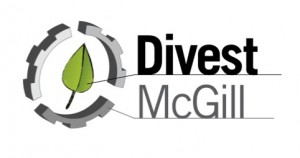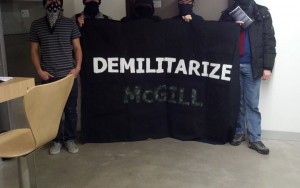A year and a half ago, three McGill students who were inspired by the Climate Change Youth Coalition decided to address Canada’s fossil fuel dependency. The students– one of which was David Summerhays, who holds a BA in History from McGill– submitted Access to Information (ATI) requests to the McGill administration regarding the extent of McGill’s involvement in the fossil fuel industry.
The Onset of Controversy
When the Divest members submitted ATI requests, they were looking to find out which fossil fuel companies McGill was investing in, and whether McGill held research contracts or job fair agreements from these companies. However, the process to obtaining this information resulted in a complaint where numerous students – including Summerhays – were accused of conspiring to overwhelm the secretary with the requests.
Recently, a settlement was reached between the students and McGill administration, where, according to Summerhays, McGill “agreed to a timeline for responding to [their] requests, and in exchange [the students] chose the requests [they] were most interested in.” McGill is expected to reply to Summerhays’ request by the end of March, while other requests will be met at separate times.
Demilitarize McGill is among a number of other organizations that submitted ATI requests to McGill administration. According to Demiltiarize’s twitter page, the administration “has until Friday [February 28] to respond to military research ATIs.”
To increase transparency, McGill revealed its investments in fossil fuel companies such as BP, Nexen, Royal Dutch Shell, Exxon Mobil, and Crescent Point Energy. Motivated by these findings, Divest McGill formed to protest against McGill’s $30 million investment in these companies.
The Development of Divest
Since its foundation in September 2012, Divest McGill has increased its presence on campus through campaigns against the exploitations taking place at the Tar Sands. Their mission is to decrease Canada’s dependence on fossil fuel by demanding that McGill divest its investments in fossil fuel and tar sands companies.
Out of McGill’s endowment of $1 billion, three percent are invested in these fossil fuel companies. Divest is pushing for the McGill administration to invest in different industries or even alternative energy resources, which have been shown to be more profitable than the fossil fuel companies for the last one to five years, according to Divest McGill member Amina Moustaqim-Barrette.
While Divest acknowledges the insignificant impact they may have on the economical aspect of the companies, their focus is mainly on the social and political impact their protests will have on their surroundings. Moustaqim-Barrette states that by doing so, they are “stigmatizing the industry, socially” and using a “social tactic to tell politicians that the society cares about this issue” so as to urge these politicians to “do something at a federal and municipal level.”
The movement to divest is not unique to McGill. Across North America, universities and even major cities have committed to not only divesting from fossil fuel companies, but also exploring alternative energy options. Divest McGill believes the unified effort of Divest movements across the nation is crucial to the movement’s lasting social impact. In that spirit, Divest McGill is in close partnership with Divest Concordia.
Demilitarize: Different Tactics, Same Aim
Divest and Demilitarize are similar in that they endeavor to challenge how universities use their power to influence society. According to Demilitarize member Kevin Paul: “Both organizations reject the disintegration of the boundaries between the university as a public institution and the sphere of the public market.” Despite this shared aim, the groups address different aspects of McGill’s behavior as an institution, and use extremely different means to promote their cause.
Divest McGill actively lobbies McGill’s administration to promote their agenda. They use existing processes and in this way the changes they implement are from within. Demilitarize rejects these institutional challenges and instead lobbies to place external pressure on the administration. They do so by raising student awareness of military research, picketing labs, and other means of direct action.
Demilitarize McGill has not always taken such radical means. When the club was first formed in 1984, their strategies included lobbying administrators, filing formal complaints, and proposing new policies. The initial strategies of the club are similar to those currently used by Divest.
After a four-year battle with administration, Demilitarize succeeded in implementing an ethical policy which required any military funded research to indicate negative implications of the research in the grant application. To their disappointment, the club did not believe that the administration adequately enforced the policy. Demilitarize voiced their concern in 2009, proposing new policies to more strictly enforce ethical guidelines. This proposal was rejected by McGill.
The club’s modern incarnation has since abandoned this approach of working within institutional framework, having been discouraged by previous failures with the administration to act in accordance with the aforementioned policy.
Demilitarize has been criticized for their extreme methods; however, the organization feels it is warranted in light of their past interactions with the institution. “If the administration isn’t sympathetic to the cause then they won’t prioritize it,” explained Azad Kalemkiarian, a first year Urban System’s student and Demilitarize member. “If McGill does divest, it will only be because they face immense pressure. For that to happen there needs to be an intensification of the dialogue on campus to include as many people in the movement as possible.”
Joining the Movement
Recently, the divest movement was taken up by Lockout Petroculture, a temporary group that formed to disrupt the Petroculture conference that took place on McGill’s campus from February 6th to 7th. The conference examined the ways in which the oil industry influences individual’s daily lives. Lockout Petroculture claimed that the conference disproportionately featured pro-oil opinions, failing to recognize the environmental and social harms caused by the oil sands.
Divest McGill stands in solidarity with the mission of Lockout Petroculture, according to Moustaqim-Barrette. Divest also took issue with the conference because “the conference’s premise was whether Canada is a petroculture, and whether Canada is socially and economically reliant on fossil fuels,” she stated. She believes this “should not even be a question.” Furthermore, the conference hosted a speaker who denies the occurrence of climate change, to which Moustaqim-Barrette stated: “it’s absolutely ridiculous that is happening at an academic conference,” and noted the overwhelming scientific evidence to support the issue.
On February 7th, a group of 30 individuals from Lockout Petroculture barricaded the conference building. The protest was so effective that the conference was forced to relocate to another building for the day.
While Divest McGill did not arrange the barricading protest, six to seven of Divest members – in their bright orange shirts and Divest McGill buttons – organized an effort to attend the conference and participate in the discussion. According to Moustaqim-Barrette, the members actively engaged in the debate by asking questions to speakers on both sides, and helped focus the conversation away from suggestions on how to make fossil fuels or pipelines safer to how to transition away from fossil fuels.
Divest considered their participation in the conference to be successful, and were openly endorsed by environmental group speakers at the event. Moustaqim-Barrette recounts that Divest was not expecting this outpour of support, and was glad that they made many allies that day.
The last day of the conference, Divest organized a “counter-conference” called “Notre Futur! For a Fossil-Free Future.” They invited students to share their visions for a fossil free future, and provide students an opportunity to oppose the perpetuation of the petroculture.
Looking Ahead
Moustaqim-Barette added that Divest plans to hold several workshops over the year to “explain what Divest is, why they are doing it and what they are divesting from” to clarify their mission to the student body. Additionally, they intend to focus on professor outreach.
Divest hopes that McGill will “divest in a few years, if not sooner” thanks to Divest’s active meetings with the administration, and additional societal pressure to move away from fossil fuels. If the university decides to divests from fossil fuels, it will certainly be an outstanding for success for all of the students involved in the movement.



